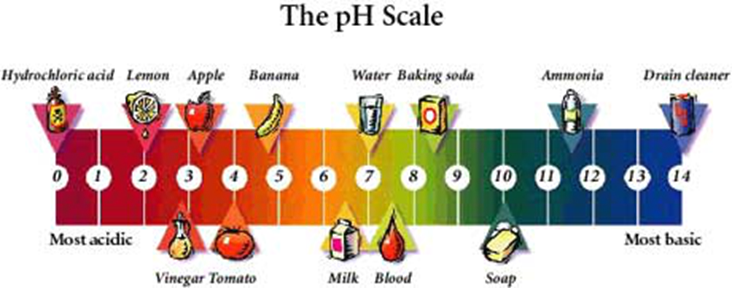Just a quick word on buffering when referring to pH solutions Basic/acidic insight

Just a quick word on buffering when referring to pH solutions. It would not be necessary to use Ph values if all acids were ionized to the same degree, but they are not. For example, the pH of a solution of the following acids at 77 degrees (25C) is as follows: * Hydrochloric acid: 1.1 * Sulfuric acid: 1.2 *Citric acid: 2.2 *Acetic acid: 2.9 The strength of an acid depends not on it’s total acidity (concentration of molecules), but only on the concentration of hydrogen ions. PH is extremely important in biological fluid systems such as human blood and the fluid of plants. Natural biological systems are protected against catastrophe of sudden influx of acids or bases with built in buffering agents that keep the pH relatively constant. Hydroponic solutions do not have a built in buffering system, organic solutions may have one, but that is entirely dependant on the nature on organic matter in solution. If a hydroponic solution is experiencing too many wild pH swings, control can be had by adding an appropriate buffer to the formula or solution. There are a number of commercial inorganic nutrient formulas available having pH buffering agents. Buffering chemicals need to be compatible with the other chemicals in a hydroponic solution; this is critically important for the buffers employed in biological systems. The two most commonly used buffering mixtures are the Mcllvaine and the Britton-Robinson systems. Mcllvaine buffer is a mixture of citric acid and sodium hydrogen phosphate that buffer pH in the range of 2.2 and 8.0. The Britton-Robinson consists of acetic acid, phosphoric acid and boric acid, plus sodium hydroxide and buffers pH in the range of 4.0 and 11.5. Now comes the good part Citric Acid! Commercial citric acid is produced by a microbiological process employing the mold Aspergillus niger. It is safe to handle, inexpensive, readily available, stimulates growth, performs as a natural chelating agent for trace elements thereby increasing the nutrient values of the plants, and is the ideal pH buffer for hydroponic and bioponic solutions. Pure citric acid is a plant acid with a pH of 2.2. Classified as a weak acid, it is very stable and good for maintaining the pH level desired in a hydroponic nutrient solution. Plant roots will absorb some of the citric acid thereby increasing the citric acid cycle within the whole plant. When citric acid and various microorganisms are incorporated into the nutrient solution, chemical changes occur, activating the Kreb cycle converting citric acid into a number of other plant acids, such as ketoglutaric, succinic, fumaric, malic, oxalo-acetic, and finally degrading to water and carbon dioxide. The citric is well known for it’s role in soil, animals, humans and plants. Research over the last few decades demonstrate plant acids are essential in plant respiration and other basic life processes. The use of citric acid in hydroponics and bioponic nutrient solutions takes these systems one step closer to the natural environment in which plants feel most at home.


